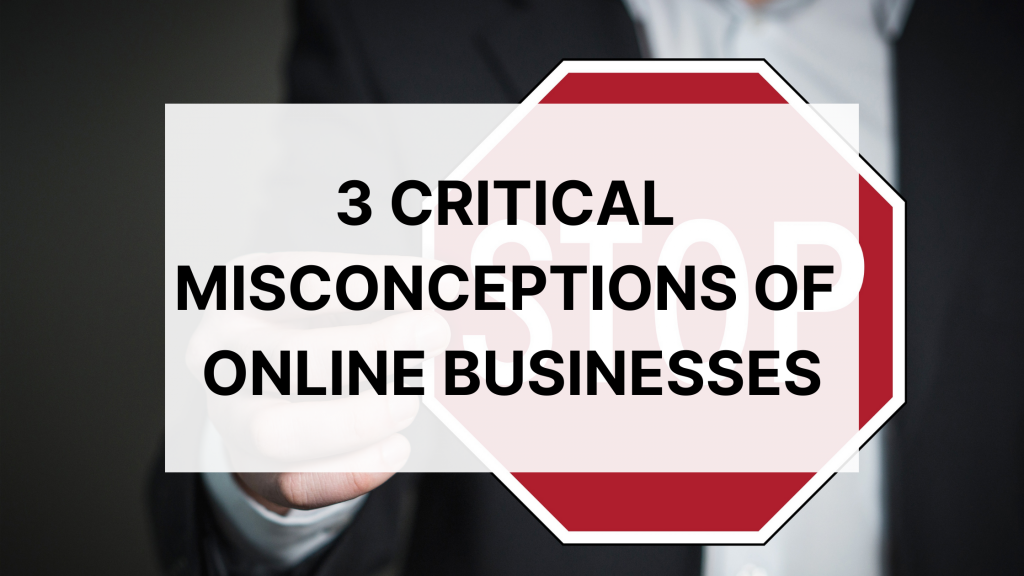
We live in a digitalized era where e-commerce has become an everyday part of life. This is a world where buyers have access to an endless variety of products, and sellers can expose their products to potential customers all over the world. At the top, there are e-commerce companies like Amazon and Alibaba. At the grassroots level, tools like drag-and-drop websites, dropshipping, and social media have many people starting their own small e-commerce businesses from home.
The question now is not “Can I start a business?” but “How do I make my business successful?” Although the tools and technology needed to set-up an e-commerce business are widely available, succeeding in e-commerce requires sufficient resources, strategic positioning, and constant evolution.
Below are three common misconceptions about running an e-commerce business and their corresponding realities.
You can succeed in e-commerce with minimal resources.

Many believe that cost-saving is one of the most significant benefits of an e-commerce business. They think that the only resources needed are an internet connection and a laptop. This is a misconception.
Successful e-commerce businesses need sufficient human, technology, and financial resources to succeed. In fact, the most profitable companies use both dedicated teams and external resources to maximize their digital touchpoints’ utility. We will discuss dedicated e-commerce teams later in this article. First, let’s talk about some of the external resources that successful businesses use.
According to a Forrester report on e-commerce, 27% of global purchase influencers at wholesale or retail companies prioritize innovation as part of their 2021 objectives. External resources can help. Utilizing external resources that come with technology partnerships provides businesses with the innovative power, tools, and capabilities they need to deliver an excellent customer experience within budget and time constraints.
Examples of possible technology partnerships include review platforms, digital workspace tools, and CRM platforms.
E-commerce businesses require less skill and experience to run than brick-and-mortar stores.

Another misconception is that unlike physical businesses, online companies can be run by anyone with an idea and an internet connection. People think that because establishing a physical business is a difficult task compared to setting up an online business, there is less pressure and stress on online business owners. They think it’s easy for the owner to manage his business activities worldwide by sitting in his room or office with a laptop.
The truth is that successful e-commerce businesses require both strong C-level support and a digitally fluent team of experts.
C-level support means that everyone is on-board with the chosen e-commerce strategy, especially those at the company’s top. This support ensures that initiatives will receive enough financial and human resources to succeed. Additionally, leaders must set the right expectations and work hard to follow through on promised growth.
One thing that can help leaders deliver set targets is hiring and maintaining a digitally fluent team. While this can be challenging since digital talent remains rare, ensuring that the business has qualified talent fulfilling key roles such as business technology, merchandising, fulfillment, marketing, and customer service is essential.
E-commerce businesses should sell to everyone.

The final misconception is that since online businesses have access to everyone who has access to the internet, they should try to make everyone their customer.
While it is true that people can purchase your products from any part of the world at any time, in a highly competitive landscape, e-commerce businesses that offer something unique to a highly specified set of customers and who can communicate that exceptional value are best positioned to succeed.
Choosing a specific target customer, knowing everything about them, and providing products or services that solve their pain points is how any business, online or not, succeeds. Since the barrier to entry is lower with online companies and competition is high, this becomes even more important. Most digital businesses have both offline competition and aggressive players like Amazon. Having a strategy to stand out becomes very important.
The Bottom Line
While we live in a world where e-commerce exists everywhere, running a successful online business requires much more than a laptop and an internet connection. Running a successful online business is an ongoing process that requires dedicated teams, ample external resources, strategic targeting, and an ever-evolving mindset.
The competitive landscape is constantly changing, requiring companies to evolve and adapt. The most successful e-commerce businesses will optimize their talent, strategies, and market opportunities, while others get lost in the noise.
AirSend is a versatile digital workspace to share files, send messages, have voice/video calls, and complete tasks. Click here to see how AirSend can help you.